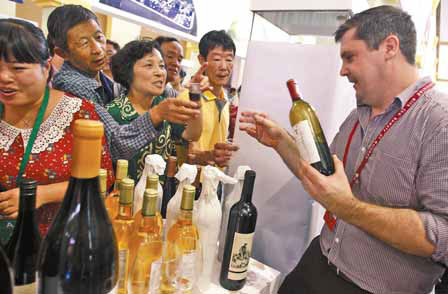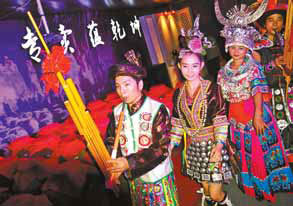|
|

Visitors line up to try wine at the booth of Australia's Ausino Rose Valley Estate at the Guizhou Alcoholic Beverage Expo.
|
As visitors to the second China (Guizhou) International Alcoholic Beverage Expo sample the province's many varieties of liquor, they will also be getting a taste of the diverse ethnic cultures that produce them.
The province's ethnic groups have played an important role in the development of the province's alcohol industry, said Wang Shizuo, a professor at Guizhou University.
Wang's research has shown that the traditional alcohol culture of the Gelao ethnic group has been vital to the emergence of Moutai, the nation's most famous liquor.
The so-called national liquor of China, Moutai is one of three world-famous liquors, along with Scotch whisky and French cognac. Named after the town of Maotai, the town of where it originated, the alcoholic product is known worldwide for its characteristic pure and transparent color as well as its strong, mellow fragrance, smooth taste, and cool and refreshing flavor.
Wang's research discovered that the ancestors of today's Gelao people started living in communities in the Maotai region thousands of years ago. At that time, the geography in the region was extremely suitable for alcohol production, and so it spawned a strong alcohol-producing culture.
"Maotai's unique setting and climate account for the sauce-like fragrance of the liquor," Wang explained. "The town is surrounded by three mountains. This natural 'cage' produces the proper humidity and temperature that make it an ideal venue for liquor production."
"Sauce-fragrance liquor is generally produced from rough alcohol made with high-quality wheat, locally produced high-quality sorghum and water from the Chishui River that runs through the town. The traditional method involves at least eight cycles of fermentation and nine rounds of high-temperature distillation under strict conditions. After the processes, the liquor batches are stored at least five years in jars before they are put on the market."
Wang said he believes that the techniques for making Moutai were passed down from the ancestors of the Gelao people and improved generation after generation.
Yuan Renguo, chairman of the Kweichow Moutai Group, supports the professor's findings.
|

People of the Dong and Miao ethnic groups promote diverse ethnic cultures at a booth displaying Qingjiu alcohol.
|
"According to historical records, in 135 BC an envoy named Tang Meng drank sauce-flavored liquor produced in Guguo (today's Moutai Town) and brought some to Emperor Wu of the Han Dynasty (156-87 BC). The emperor spoke highly of the liquor, and it was regarded as Guizhou's tribute to the royal family."
The alcohol has grown in popularity since then and was introduced to the Western world when Mao Zedong served Moutai at state dinners during Richard Nixon's state visit to China in 1972. His Secretary of State Henry Kissinger remarked to Deng Xiaoping that "if we drink enough Moutai, we can solve anything."
Other renowned Guizhou alcohols also have their own cultural stories. Both Guizhou Xiongzheng alcohol and Guizhou Longcheng alcohol trace their roots back to the ancient Bouyei ethnic group, according to the producers of those types of liquors.
The Bouyei people, who live in a natural and beautiful environment, are fond of drinking homemade rice wine and corn wine.
"They have a custom to share guests among village members. When one family has guests coming, the whole village will regard them as their own guests. They are invited to all the households in the village to drink alcohol," said Zhang Zaibin, chairman of the Guizhou Xiongzheng Alcohol Factory.
Another famous brand, Guizhouchun alcohol, was originally produced in Xingyi, another place mainly occupied by the Bouyei people. The alcohol has gained fame around the world thanks to its clear appearance, rich grain and classic taste.
Despite its success, the Bouyei people have not stopped innovating new alcoholic beverages. To meet the demand for alcohol with a softer taste, they recently produced and developed a newcomer named Qixiang.
Qingjiu alcohol is another of the province's liquor brands, and it originated in Guizhou's southeast, where the Miao ethnic group live. The Miao people have more than 100 festivals, the most famous being the Lusheng Festival, Gucang Festival and Sisters' Meal Festival.
Qingjiu alcohol is indispensable at all of the festivals. The low-alcohol sticky-rice wine, generally stored for generations, is often used to treat guests and reflects the Miao people's honesty and warmth.
As Wang said, Guizhou's alcohol industry, led by the increasingly popular Moutai, is gradually taking shape thanks to the province's unique mix of splendid ethnic culture and innovative spirits.
Contact the writers at [email protected] and [email protected]
(China Daily 09/10/2012 page18)
|